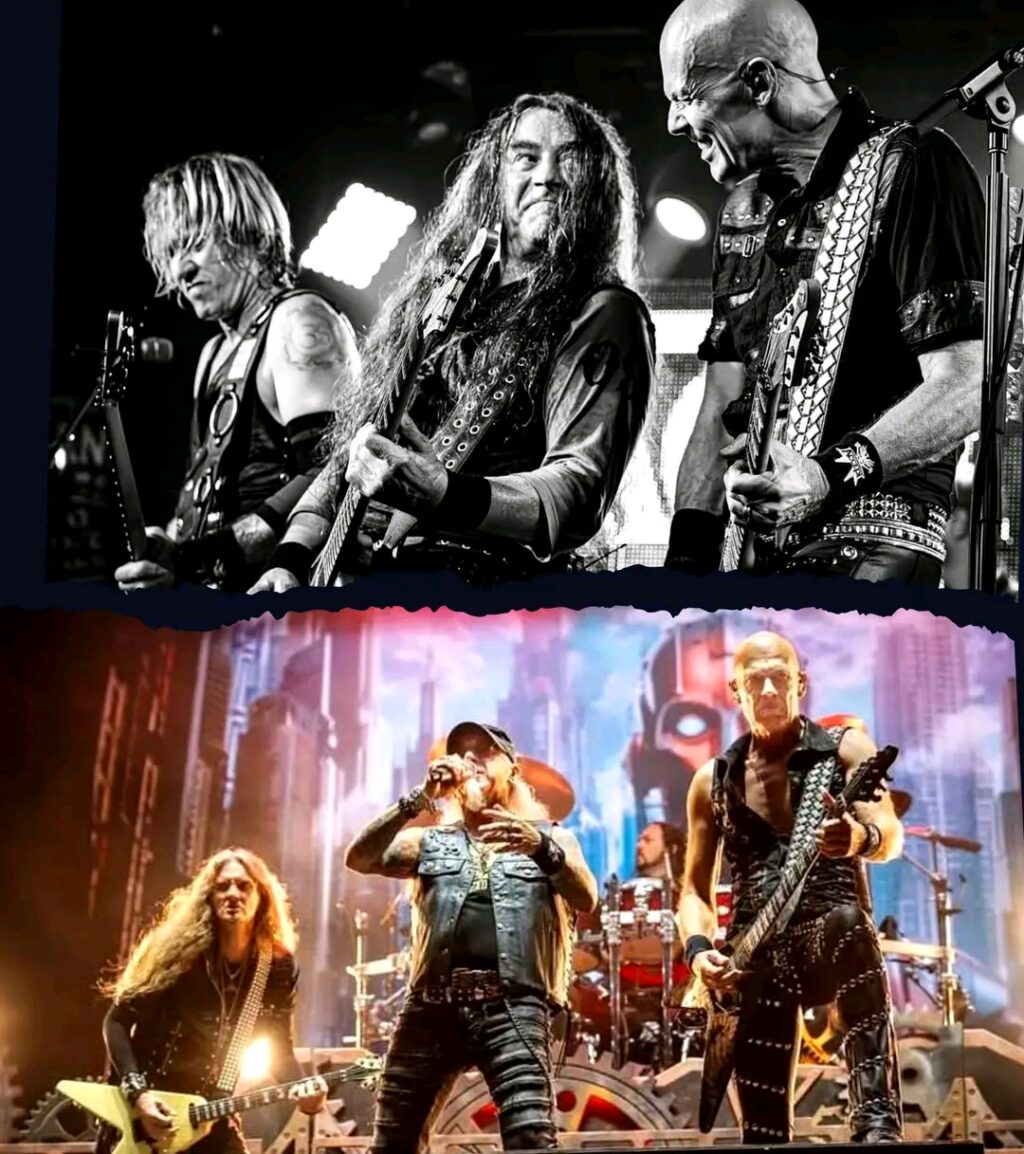
Russian Roulette: A Milestone in Accept’s Legacy
In 1986, the German heavy metal band Accept released their seventh studio album, Russian Roulette. Widely regarded as a pivotal moment in the band’s storied career, this record stands as a testament to their musical evolution, and it also marked the end of an era for Accept. Not only did it showcase the band’s unrelenting drive and ambition, but it also represented a significant departure from their previous works in both musical direction and production.
Russian Roulette was released in a period of intense transformation for Accept, both musically and within the band itself. While the early 1980s had seen the band rise to prominence in the heavy metal scene, it was with this album that they began to embrace a more experimental sound. It was their first studio album to be recorded without the familiar presence of their longtime producer Dieter Dierks, who had worked with the band since their early years. The decision to self-produce was a bold one, and one that reflected the band’s desire to take more creative control of their sound.
In this in-depth exploration of Russian Roulette, we will take a closer look at the album’s creation, its impact on the heavy metal genre, and its place in the larger narrative of Accept’s storied legacy.
The Evolution of Accept: A Band at the Crossroads
By the time Russian Roulette was released in 1986, Accept had already established themselves as one of the premier heavy metal bands in Europe. Their previous albums, particularly Breaker (1981), Balls to the Wall (1983), and Metal Heart (1985), had garnered widespread acclaim for their blend of powerful riffs, soaring vocals, and the distinctive sound that defined their brand of heavy metal.
However, by the mid-1980s, the heavy metal landscape was beginning to shift. The genre had seen the rise of new wave British heavy metal bands, glam metal acts from the United States, and thrash metal pioneers like Metallica and Slayer, all of whom were beginning to challenge the traditional heavy metal sound that Accept had helped define. The band was aware that to stay relevant and continue their trajectory, they would need to evolve.
This need for change was reflected in Russian Roulette. While the album still retained the core elements that had defined Accept’s sound, such as crunchy guitar riffs, thunderous drumming, and Udo Dirkschneider’s unmistakable vocals, there was a noticeable shift in the music itself. The band experimented with new musical elements and incorporated more complex arrangements, resulting in a sound that was both familiar and fresh. The decision to self-produce the album was a reflection of this desire for artistic autonomy. The band felt that they had grown beyond the need for an outside producer to guide their vision and instead chose to work together to shape the sound they wanted.
The Recording Process: A Shift in Creative Control
The recording of Russian Roulette took place at Dierks Studios in Germany, a location that had become synonymous with Accept’s earlier successes. However, this time the band made a conscious decision to move forward without Dieter Dierks, who had previously played an instrumental role in shaping their sound. The band’s decision to self-produce marked a significant turning point, not just in their musical approach but also in the way they approached their work as a collective.
The production process was challenging, as the band had to navigate new creative territory on their own. In hindsight, the decision was a double-edged sword. While it allowed Accept to bring their vision to life without external influence, it also meant that they had to take on more responsibility for the final product. The result was a raw, unfiltered album that had the band’s signature sound, but with added depth and complexity. The lack of an external producer also meant that the band had to rely on their instincts, leading to a more personal and introspective approach to the album’s creation.
Despite these challenges, Russian Roulette is considered one of Accept’s most polished records to date. The band made use of cutting-edge technology in the studio, experimenting with multi-layered guitars and more intricate production techniques. The result was an album that had a richer, more textured sound than its predecessors. The complexity of the songwriting also became more evident, with tracks like “T.V. War” and “Russian Roulette” offering more sophisticated arrangements and lyrics than anything the band had previously done.
Udo Dirkschneider’s Last Appearance (For Now)
One of the most significant aspects of Russian Roulette is that it would be the last album to feature Udo Dirkschneider as the band’s lead vocalist until the 1993 reunion album Objection Overruled. Dirkschneider had been the face and voice of Accept since its inception, and his unique voice had become synonymous with the band’s identity. His high-pitched, aggressive vocals were one of the defining features of Accept’s sound, and his departure from the band marked the end of an era.
At the time of the recording of Russian Roulette, tensions were beginning to mount within the band. Though Accept had achieved commercial success, the internal dynamics were beginning to fray. The band’s decision to part ways with Dieter Dierks was part of a larger shift in how they wanted to approach their music, but it was also a reflection of the broader changes happening within the group. In interviews, Dirkschneider later revealed that he had grown frustrated with the direction the band was heading in, which ultimately led to his departure after Russian Roulette was completed.
Though his exit was a blow to the band’s core identity, Accept would continue to evolve, incorporating new members and new influences. However, Russian Roulette stands as a testament to the power of the band’s original lineup and the chemistry that made their music so iconic.
Track Breakdown: A Bold and Diverse Collection of Songs
The album opens with “T.V. War,” a track that sets the tone for the rest of the record. With its thrashy riff, pounding drums, and anthemic chorus, “T.V. War” is a powerful commentary on the state of modern media and the way television can shape public opinion. The song is a perfect example of Accept’s ability to blend social commentary with their high-energy metal sound.
“Russian Roulette,” the title track, is another standout, featuring a catchy, driving rhythm and an unforgettable guitar riff. The lyrics explore the theme of risk and fate, with the metaphor of the roulette wheel serving as a powerful symbol of life’s uncertainties. The track became one of the most memorable songs in the band’s catalog, and it remains a fan favorite to this day.
Other tracks, such as “It’s Hard to Find a Way” and “Aiming High,” showcase the band’s ability to balance heavy riffs with more melodic elements, demonstrating the growth of Accept as a musical force. There is also a certain introspection on tracks like “The Zoo,” which presents a more reflective, almost eerie atmosphere. The variety of songs on Russian Roulette helped to cement the album as one of the band’s most diverse and ambitious works.
The Reception: A Mixed but Significant Impact
Upon its release, Russian Roulette received a mixed reception from critics and fans alike. Some appreciated the bold direction the band had taken, while others felt that the album was a departure from the sound that had made Accept a household name in heavy metal. The decision to self-produce, while empowering, may have led to some inconsistencies in the final product, with certain tracks being lauded while others were criticized for feeling underdeveloped or lacking the polish of previous albums.
Despite the mixed reviews, Russian Roulette achieved moderate commercial success, further solidifying Accept’s place in the heavy metal pantheon. The album’s themes, particularly its focus on societal issues, resonated with fans, and its combination of hard-hitting riffs and thought-provoking lyrics ensured that it would endure as an important release in the band’s career.
Legacy and Final Thoughts
In hindsight, Russian Roulette marked a significant turning point in Accept’s history. It was an album that saw the band take risks, both musically and personally, and it would go on to influence the heavy metal genre for years to come. Although it would be the last album to feature Udo Dirkschneider for several years, Russian Roulette helped to solidify the foundation for the band’s eventual return to the forefront of the metal scene in the 1990s.
In many ways, Russian Roulette was the final statement of the classic Accept lineup. Though the band would go on to experience further changes and new iterations of their sound, this album remains a critical piece of their legacy. It is a powerful reminder of the risks that bands must take in order to evolve and continue to thrive in an ever-changing musical landscape.





